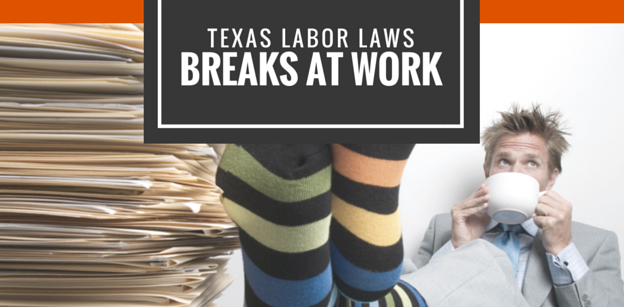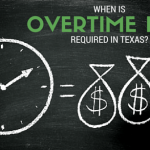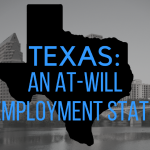Under Texas Labor Laws that address break periods throughout a workday, employers have no legal obligation to provide their employees with coffee, rest, or lunch breaks. Many employers do offer this benefit, but since it is their choice and not a legal requirement, they can eliminate this perk at any time.
Federal and Texas Laws:
The United States Department of Labor’s policy regarding breaks and meal periods does not require employers to provide lunch or coffee breaks and Texas Workforce Commission laws are the same. Under these laws, if an employer offers short breaks of between 5 and 20 minutes, they are considered part of an employee’s workday and must be paid and included when determining overtime. Bona fide meal periods are different from the short breaks and usually last at least 30 minutes. These meal breaks are not considered work time and therefore are not paid or considered when calculating overtime. It is important for employees to remember that the rules on what break periods are or are not compensated is only relevant if the employer chooses to provide these breaks.
Additional Breaks:
Although Texas employers are not required to provide breaks under current Labor Laws there are some exceptions to these rules including:
- Nursing Women: Federal Labor Laws require employed women be allowed a reasonable time to breast feed or express milk for the first year of their child’s life. She does not have the right to be compensated for this break unless she uses her allowed “short breaks” to perform this task, if this option is provided through her employment.
- Rest Break Ordinance: In 2010, Austin, Texas enacted an ordinance that states, “All employees performing construction activities at a construction site are entitled to a rest break of no less than ten (10) minutes for every four (4) hours worked. No employee may be required to work more than four hours without a rest break.” (Ordinance No. 20100729-047).
In addition, an employer cannot discriminate by giving one employee or group of employees breaks but not others.
Working Lunch:
Federal and Texas labor laws require that employees be compensated for the time they work. While employers are not required to pay employees for meal breaks, they must do so if an employee works through this break. Federal and Texas Labor Law requires that an employee must be relieved of all duties during the meal break for it to be unpaid. Employees who are not relieved of all active or inactive duties while they are on a meal break must be compensated for their time as a working lunch. Work activities can include but are not limited to:
- Answering telephones
- Greeting clients, customers, or visitors
- Reading or writing work-related documents or reports
- Meetings
If an employee engages in these or other work related activities, he or she must be paid for this time.
Employee Rights
All employees in Texas are required to be paid for their work. However, under Texas Labor Laws on rest and lunch breaks, employees have no legal right to demand or require such breaks. If an employer does provide breaks, all employees are entitled to be paid for short breaks as part of their daily work but not meal breaks unless such breaks qualify as a working lunch.
If your pay is docked for allowed short breaks or working lunches, you can take measures to recoup your docked pay. To learn more about your rights and possible claim under Texas Labor Laws regarding breaks, consult with an experienced employment attorney in your area.








